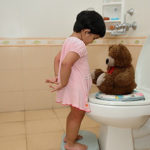Day time and Night time wetting

Potty training and night time wetting can be very confusing for you and your child. We have put together a few tips below but please remember to speak to your health visitor or GP if you have concerns.
Potty Training
If you have a toddler you may be starting to think about potty training. Here’s a few tips from https://www.howtopottytrain.com/ to get you started:
Are they ready?
Look out for signs that they may be ready.
Be prepared to wait if not – remember all children are different.
Getting ready
Put in place a good routine
Look out for key signs of readiness https://www.howtopottytrain.com/
Be consistent
Going for it!
Once you take the nappy off, keep it off (you may find the summer a better time to start!)
Let your child choose their own grown up pants
Use a step stool and seat on the toilet
Keep books or toys in the bathroom to occupy your child
Reward all aspects of the potty training routine!
Keep it going
Keep children well hydrated; plain water is best
Avoid the urge to keep asking if they need a wee
Introduce toilet time about 20 minutes after a drink, and 30 minutes after food
Dealing with accidents
Accidents are normal; children learn through trial and error
Tell off the wee or poo – not your child
Night time
Night time training comes later
Wait approximately six months after day time training
If you are unsure about any of the above please speak to your health visitor of GP.
You may notice a change with behaviours as your baby moves into being a toddler. You may be interested in our Raising Toddlers course. Please see our What’s on for Parents to see what’s coming up or contact us for more information.
Tips for improving bed wetting for older children
Often children will be toilet trained during the day but will still suffer with enuresis (bed wetting) at night. Around 10 percent of seven years olds wet the bed at night. The cause maybe due to a small bladder capacity or the body not producing Valpressin a hormone that concentrate the urine at night.
If your child is wetting the bed you may find the following tips helpful.
- Increase fluids during the day (this will increase bladder capacity). Encourage children to drink during the school day.
- Avoid caffeine or red berry drinks which will aggerated the bladder.
- Reduce fluids an hour before bed time, small amounts of water but nothing else.
- Encourage your child to make two trips to the toilet the hour before bed.
- Treat constipation- this can impact on bladder capacity.
- Consider making the room darker, if the above is not working- some children will not produce Valpressin if the room is too light. Perhaps have a night light they can switch on.
- Be positive, child do not have control of they wet the bed.
- Don’t wake children during the night to get them to go to the loo, they will not develop independences at night if you do this.
If the night wetting is not improving after trying these tips speak to your G.P who may suggest using a bladder alarm.
You may be interested in our A-Z of parenting for tips and strategies for behaviour changes too.